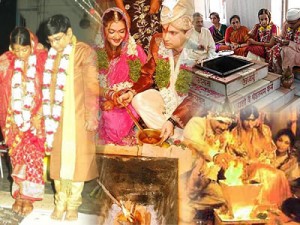
Section 2 of Hindu Marriage Act, 1955 say:
-
This Act applies –
- to any person who is a Hindu by religion in any of its forms or developments, including a Virashaiva, a Lingayat or a follower of the Brahmo, Prarthana or Arya Samaj;
- to any person who is a Buddhist, Jaina or Sikh by religion; and
- to any other person domiciled in the territories to which this Act extends who is not a Muslim, Christian, Parsi or Jew by religion, unless it is proved that any such person would not have been governed by the Hindu law or by any custom or usage as part of that law in respect of any of the matters dealt with herein if this Act had not been passed.
Arya Samaj Mandir In Mumbai This section contemplates application of the Act to Hindu by religion in any of its forms or Hindu within the extended meaning i.e. Buddhist, Jaina or Sikh and, in fact, applies to all such persons domiciled in the country who are not Muslims, Christians, Parsi or Jew, unless it is proved that such persons are not governed by the Act under any custom or usage. Therefore, the Act will apply to Hindu outside the territory of India only if such a Hindu is domiciled in the territory of India.
Arya Samaj Marriage In Mumbai The Act was viewed as conservative because it applied to any person who is Hindu by religion in any of its forms, yet clumps other religions together into the act (Jains, Buddhists, or Sikhs) as specified in Article 44 of the Indian Constitution. This Act also applies to any person who is a permanent resident in the jurisdiction where this Act applies who is not Muslim, Jew, Christian, or Parsi by religion. However, with the passage of Anand Karj marriage act, Sikhs now also have their own personal law related to marriage.
Section 5 of Hindu Marriage Act, 1955 states:-
“Section 5. A marriage may be solemnized between any two Hindus, if the following conditions are fulfilled, namely-
- neither party has a spouse living at the time of the marriage
-
at the time of the marriage, neither party-
- is incapable of giving a valid consent to it in consequence of unsoundness of mind; or
- though capable of giving a valid consent, has been suffering from mental disorder of such a kind or to such an extent as to be unfit for marriage and the procreation of children; or
- has been subject to recurrent attacks of insanity or epilepsy;
- the bridegroom has completed the age of twenty-one years and the bride the age of eighteen years at the time of the marriage;
- the parties are not within the degrees of prohibited relationship unless the custom or usage governing each of them permits of a marriage between the two;
- the parties are not sapindas of each other, unless the custom or usage governing each of them permits of a marriage between the two.”
Marriage of a female less than 18 years of age or a male of less than 21 years of age. Marriage is voidable and not void. Marriage will become valid if no steps are taken by such “child” seeking declaration of marriage as void.
Arya Samaj Marriage In Mumbai The conditions Marriage can be solemnized between two Hindus if neither party has a living spouse at the time of marriage;The conditions also stipulate that at the time of the marriage, neither party is incapable of giving valid consent or suffering from a mental illness that inhibits their fitness for marriage or procreation of children or suffering from recurrent episodes of insanity or epilepsy. In the original Act, the age of valid marriage was fixed at 18 for the boys and 15 for the girls, however this age requirement was later raised to 21 and 18 respectively for the boys and the girls through the Child Marriage Restraint (Amendment) Act 1978. Finally, the Act specifically disallows marriages between prohibited degrees of relationships.


Leave a Reply